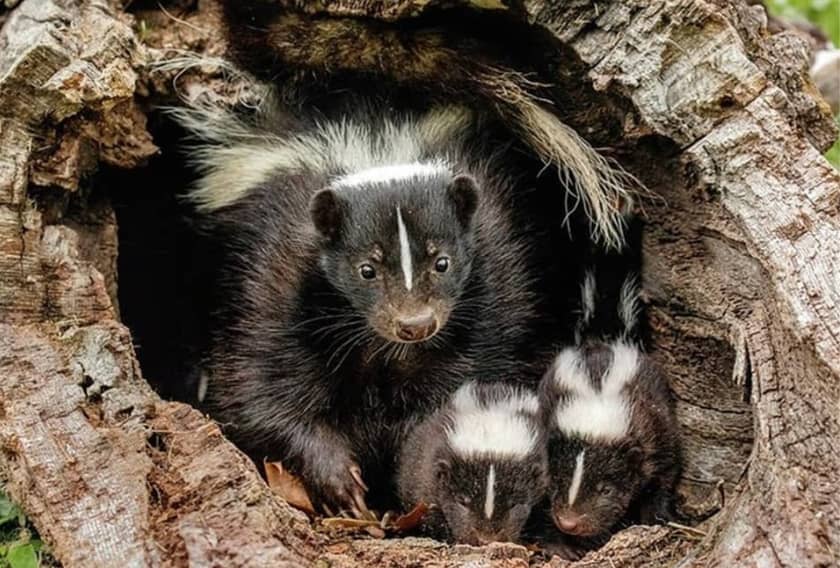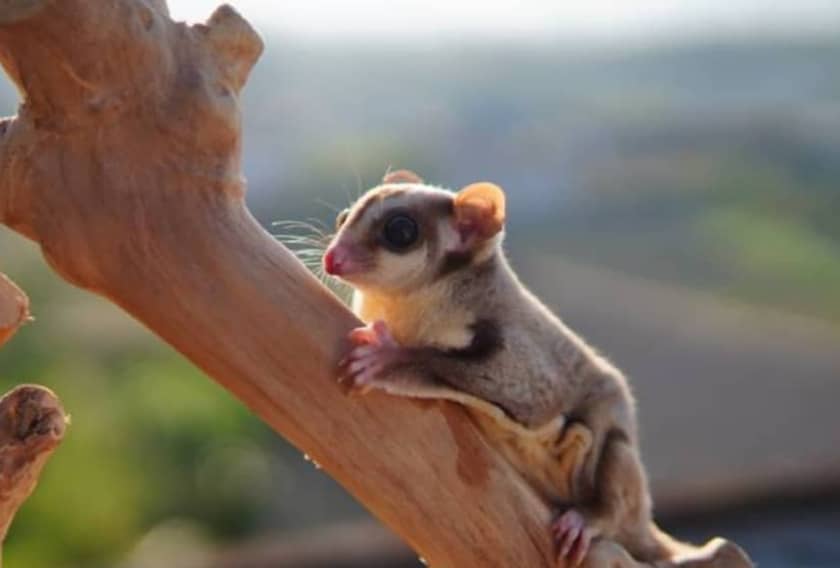A raccoon is a very interesting animal, one renowned for intelligence, gracefulness, and playfulness. Raccoons are nocturnal mammals that have a black face “mask” and their bushy tails with rings of alternating color. The animal’s facial mask, ringed tail, and incredibly nimble front paws are its most characteristic traits.

They belong to North America and are easily identified by their unique features. It is insulated from cold temperatures by its thick underfur, which makes up the majority of its grayish coat.
The raccoon is part of the Procyonidae family, which also includes other species such as the Coati, Kinkajou, and Ringtail. Each species has its own special needs and characteristics.
Even though raccoons are primarily considered wild, some people maintain them as pets because of their peculiar characteristics and behaviors. They would be a huge commitment and would take a lot of time, care, and attention.
Because they are intellectual animals, raccoons ought to be treated as such. Raccoons are known for their exceptionally good dexterity with the capabilities of opening doorknobs and containers.
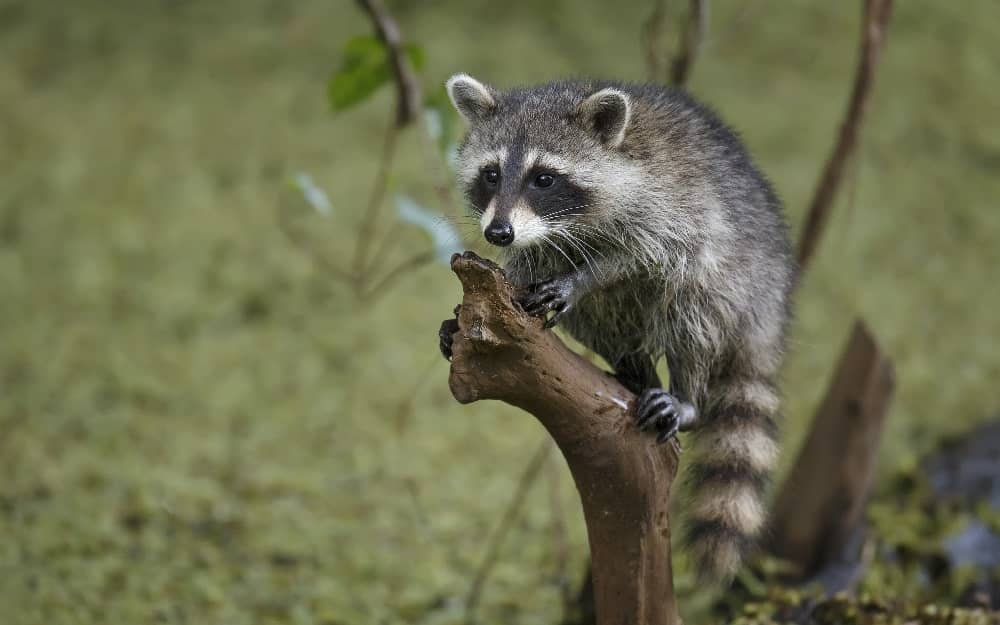
A raccoon’s hind legs are longer than its front legs, so when it walks or runs, it frequently looks hunched. A raccoon’s front paws have five very sensitive toes that act like little fingers, giving it the ability to grab and handle a wide range of items, such as doorknobs, jars, and locks, in addition to the food that it finds in the wild. The sense of touch is the most developed in a raccoon. Its front paws are extremely sensitive, and they become even more so when submerged. A raccoon will investigate anything in water when it can.
Raccoon pets are attention-seekers, so putting them in a cage and playing with them only when it’s convenient for you will not make them happy. Raccoons do, however, recognize the value of their own time, and you must respect their limits. Coexisting with a pet raccoon successfully requires giving up some control, coming up with inventive ways to get them to cooperate, and severely childproofing everything.
Male Vs Female Raccoons
Some differences in behavior and size can be noted between male and female raccoons. The males are bigger, and more territorial, while the females are mostly more nurturing and a little more docile. An important point, however, is that both genders need proper socialization and handling to make them well-adjusted pets.
Size and Weight Information
Raccoons are medium-sized mammals; adult weight usually ranges from 10 to 30 pounds with some exceptionally big reaching about 50 pounds (. Their length may also extend up to 16-28 inches in the body, excluding their tail, which can be an additional 8 to 12 inches long. The total length ranges from 24 to 38 inches on average, depending on its environment and the availability of food.
The largest member of the Procyonidae family and a medium-sized mammal is the adult raccoon. The female raccoon, known as the sow, is smaller than the male, known as the boar. Kits are the young.
Behavior and Temperament
Raccoons are intelligent, curious, and playful, gaining the reputation of being mischievous because of their getting into things. Raccoons are very social. They can bond tightly with their human caregivers; at the same time, they may prove quite stubborn and often require much mental stimulation to avoid destructive behavior due to boredom.
Given their reputation for mischievousness and unpredictability, raccoons continue to exhibit aggressive behavior even after being domesticated. Even the people they are closest to can be bitten by them. Raccoons kept as pets can be affectionate and amiable, but they also have ferocious teeth and long, sharp claws that allow them to strike at any time.
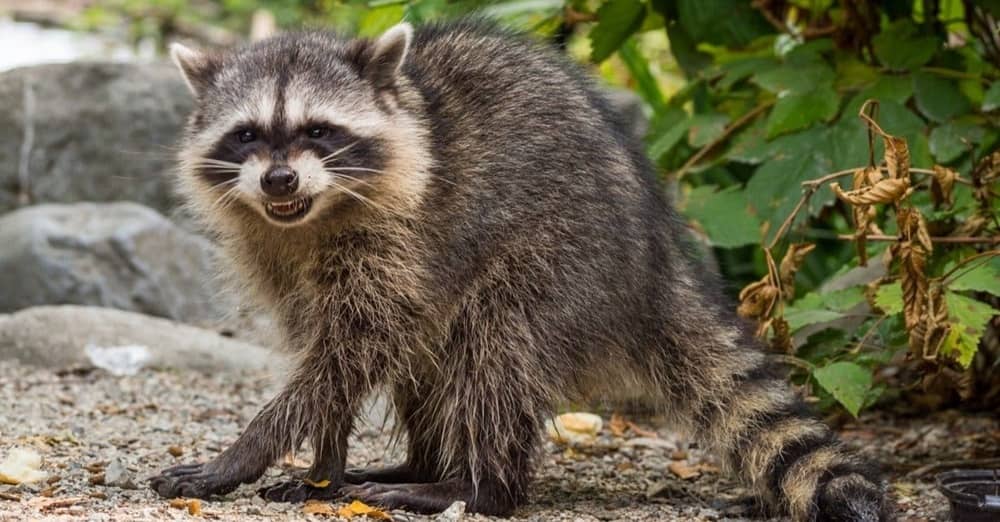
A raccoon’s hind legs are longer than its front legs, so when it walks or runs, it frequently looks hunched. A raccoon’s front paws have five very sensitive toes that act like little fingers, giving it the ability to grab and handle a wide range of items, such as doorknobs, jars, and locks, in addition to the food that it finds in the wild. The sense of touch is the most developed in a raccoon. Its front paws are extremely sensitive, and they become even more so when submerged. A raccoon will investigate anything in water when it can. They frequently behave aggressively and sullenly, and they are also very stubborn. Living with a raccoon is like having a highly-skilled, intelligent kid as a pet.
How to Care for Raccoon?
Pet raccoons require commitment and knowledge. They need a balanced diet, safe enrichment within the environment, and regular veterinary care. They require stimulation both mentally and physically for them to stay healthy and happy.
Housing Requirements
Raccoons require big cages; however, they also need to be safe. Generally, an outdoor enclosure works best since it offers ample space for exploratory behaviors and can provide space for natural behaviors to be expressed. A fantastic area to provide them with loads of enrichment is a raccoon room or enclosure. You can construct climbing frames, give them a wheel or pond, or hang swings or other toys for them. But remember that diversity is essential. Changing the toys on your pet raccoon periodically will prevent it from getting bored and destructive.
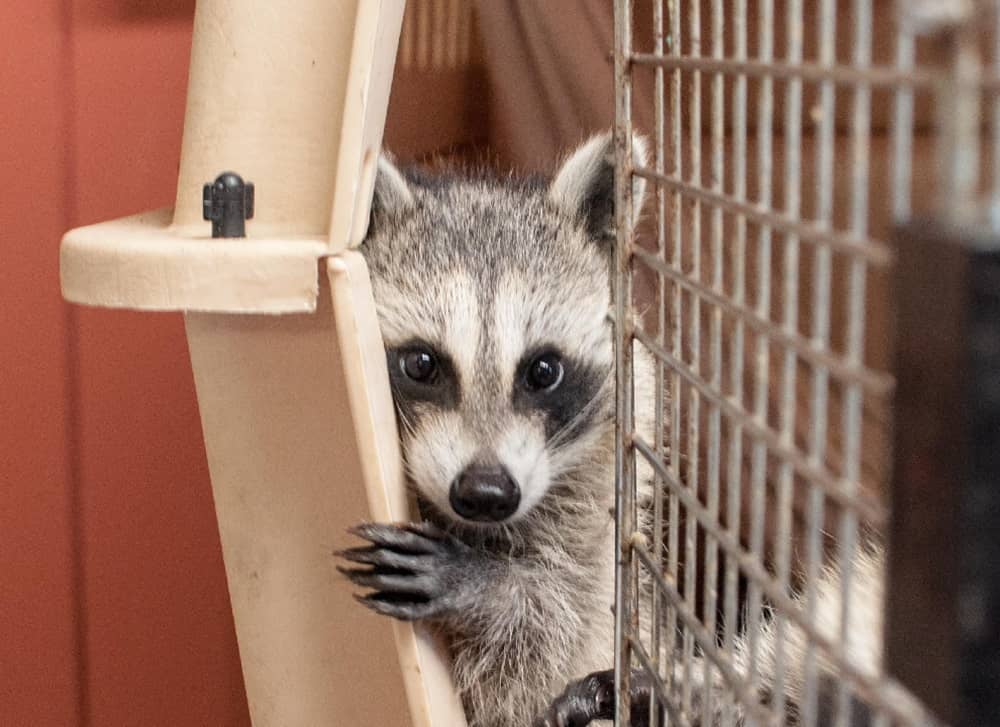
They need to be escape-proofed, have climbing structures with a place to hide, and many kinds of enrichment items to keep them occupied and busy. Indoors, they will want an area dedicated to playing without safety concerns and resting in general.
Raccoons are good diggers and climbers, so a variety of substrates would be appreciated. You can use some soil, sand, and leaf litter in the enclosure to at least give them some feeling of being in a natural environment. Branches and logs for climbing and scratching should also be a must.
Litter Box:
Raccoons can be litter-trained easily and therefore they should have access to the litterbox in their enclosure. Regular cat litter can lead to an impaction if a raccoon eats it while grooming themselves and irritates their delicate paws. Horse bedding made of pine pellets and corn cobs are superior substitutes for cat litter.
Enrichment Activities:
You can build some climbing structures, swings, or hanging ropes to make the environment more enriching. It can be a good idea to change toys and their placement to prevent boredom.
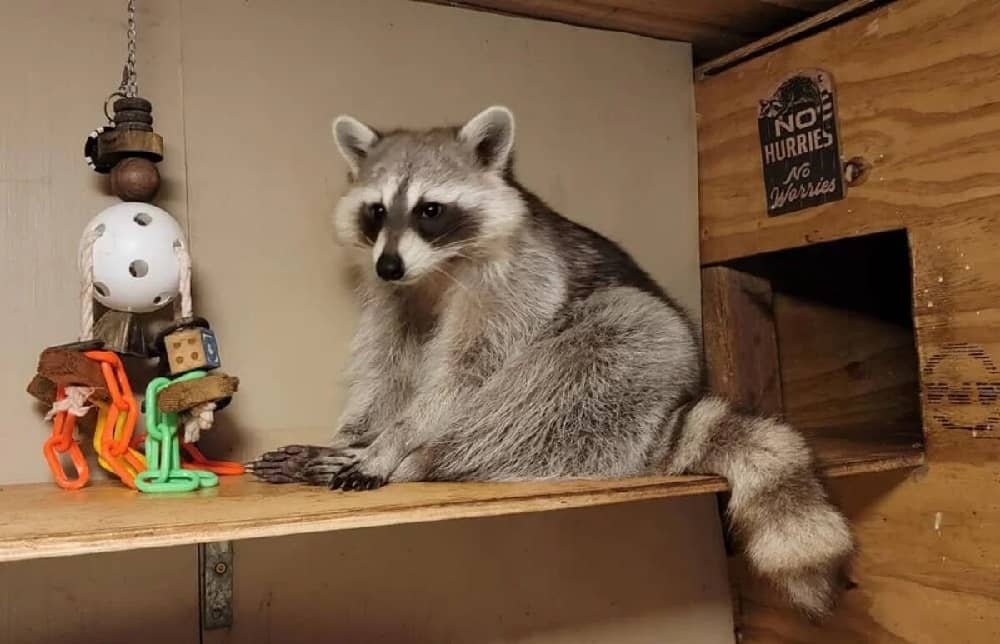
Food And Water Dish
Scattering and hiding food inside their enclosure, rather than putting it all in a dish, so they have to forage and find it themselves is also enriching. A bowl filled with clean water is a must for your raccoon.
What Do Raccoons Eat or Drink?
Raccoons are omnivores, so they will require a mixed diet. The combination shall include fruits, vegetables, and proteins like lean meats and eggs, in addition to commercial raccoon food. Processed foods, sugary snacks, and foods that contain huge amounts of fat are not good for their health.
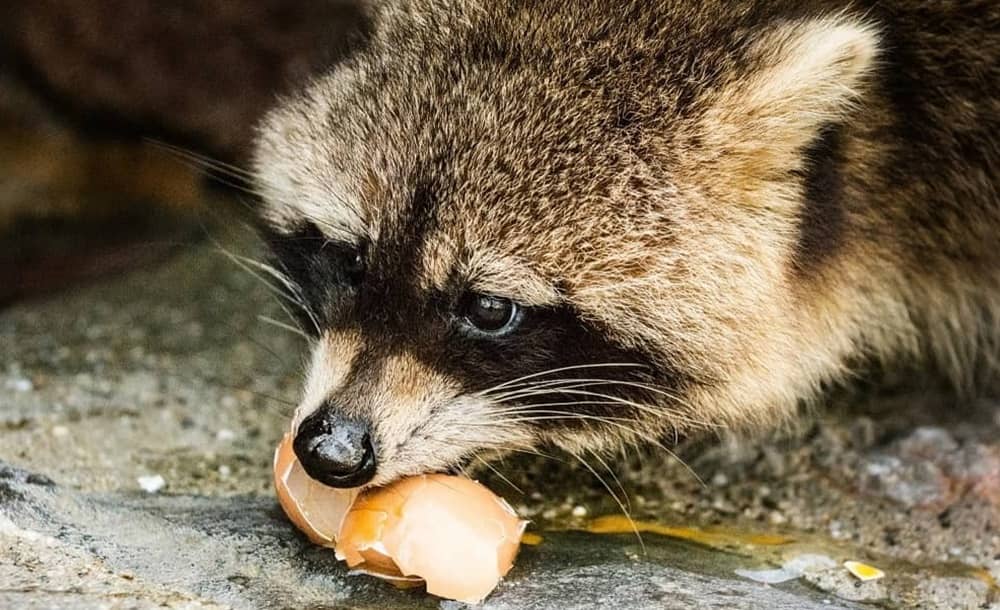
The things that our raccoons enjoy the most are sugar snap peas, poultry, eggs, roses, crape myrtle petals, carrots, cucumbers, chestnuts, and walnuts. We periodically use low-fat and protein dog chow as a treat for our pet raccoons. Feeding your pet raccoon’s conventional omnivorous diet kibble is also a fantastic all-around choice. This kibble is designed specifically for omnivores, such as opossums, skunks, and raccoons.
Exercise
They are active animals that require plenty of exercise. They love climbing, digging, and playing. An environment enriched to support physical activities is very fundamental. In this regard, daily interactive play between the raccoons and their human carers can also help them perform some physical exercises and mental stimulation.

Grooming
Raccoons keep themselves very clean; thus, in most cases, they would not require further cleaning from their owner. Added care involves combining the fur to rid it of loose hair and other pelt debris, washing the ears and teeth, and trimming of nails whenever necessary.
How to Handle a Raccoon?
Handling a raccoon takes much patience and skill. For this to be successful, a raccoon will need to be handled early in life for the building of trust and allow them to get used to being handled by a human. When handling, always gently move the animal about; never jolt or suddenly scare the raccoon into stress- or defense mode.
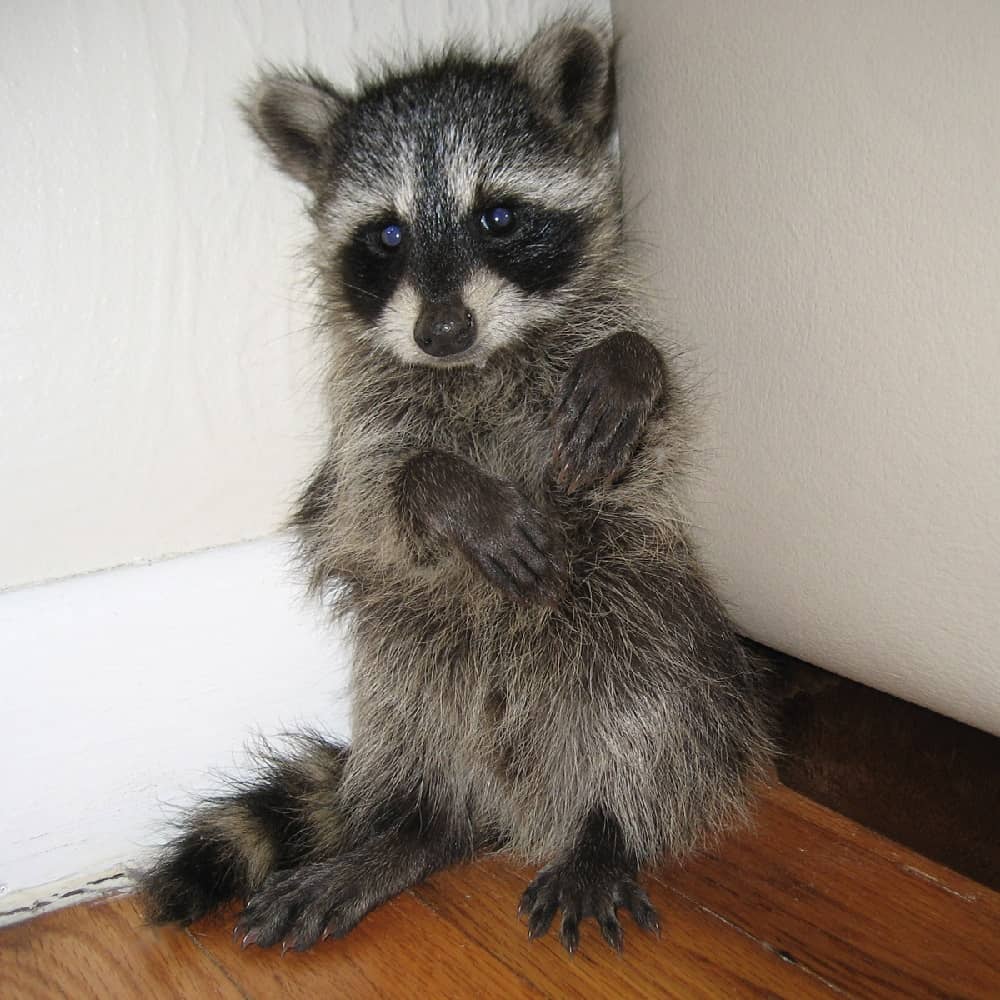
Health Issues
Some health problems that can affect raccoons include parasites, dental disease, and obesity. Regular veterinary check-ups will allow for monitoring and the early recognition of health problems. Vaccinations and prevention against parasites are also of crucial importance in their care.
Signs of Ill Health
Some signs that a raccoon is in bad health include the following: acting lethargic, having no appetite, behavioral changes, weight loss, and abnormally loose stool. If you do, then it’s imperative to seek advice from an exotic animal veterinarian when such signs appear.
Where to Buy
Raccoons are available from a reputable breeder or rescue organization. One should make sure that the seller is legal, reputed, and follows the laws regarding the selling and breeding of raccoons. Some states and countries have regulations regarding the ownership of raccoons; thus, it is imperative to inquire about local laws before procuring one. You can get a raccoon for about $400- $1000.
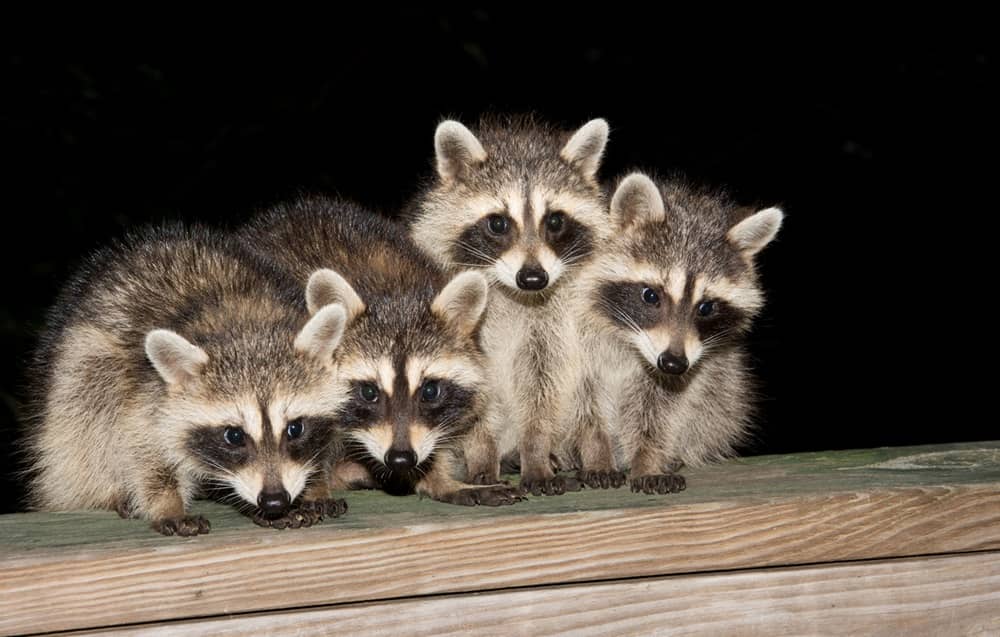
Upkeep Cost
Having a pet raccoon is, therefore, expensive. Among the costs one incurs include a proper enclosure, food, veterinary care, toys, and enrichment items. Furthermore, several medical costs may surprise one, so it is good to be financially ready to take care of them.
Reproduction and Breeding
Breeding raccoons is only done by professionals since special conditions and knowledge are required. Most of the time, females after the 65-day gestation period give birth to 2-5 kits per litter. It is pretty time- and money-consuming to bring up infant raccoons.
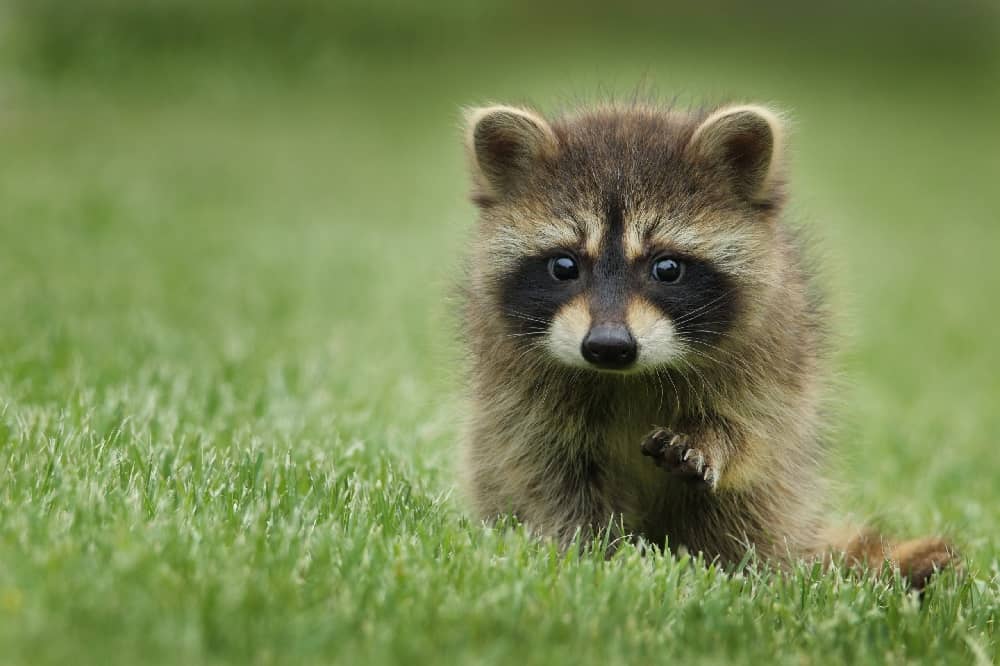
Related Species
If you are interested in keeping Raccoon as a pet, you must also consider the related species
- Skunks
- Kinkajous
- Coatis
Pros and Cons of Having a Raccoon as a Pet
The Raccoons have some specialities that make them good pets. However, there are some downsides of the fact as well and hence one should evaluate both pros and cons before keeping a raccoon as a pet.
Pros
- Unique Companions: Raccoons are not just any ordinary pet. Their intelligence and curiosity make them amazingly fascinating companions.
- Close Bonds: Socialized properly, raccoons are very affectionate. They bond strongly with their owners and love attention and interaction.
- Entertaining: With their playful and mischievous nature, the entertainment never stops. They love exploring, climbing, and playing with a wide variety of toys.
- Learning Experiences: Keeping a raccoon would be somewhat of a learning experience in that it allows one to have inside information into how they behave, habitually live, and what their natural instincts are.
- Adaptability: The raccoon can easily adapt to various kinds of living environments as long as there is enough space and mental stimulation.
Cons
- High Maintenance: Raccoons are very demanding animals. They require the right kind of food, regular visits to the vet, and a stimulating environment.
- Destructive: If he doesn’t get enough stimulation, the raccoon can become bored and destructive. Curiosity often leads him to get into things he really has no business getting into.
- Aggressiveness: Males can be quite aggressive, especially during mating. Handling and socialization must be done correctly.
- Legal Issues: Keeping a raccoon as a pet is against the law in many places or requires special permits. Check the local regulations before getting one.
- Health hazards: Raccoons are well-known vectors for dangerous diseases, which include rabies and leptospirosis. As such, one cannot forget proper hygiene measures for them, vaccination, and regular checking.
- Cost: Maintaining a raccoon will be very costly. From the price of housing, food, and toys, it also includes vet care and probably emergency treatment.
- Long-term commitment: Raccoons live 10-20 years in captivity. This indicates a serious long-term obligation on the part of an owner.
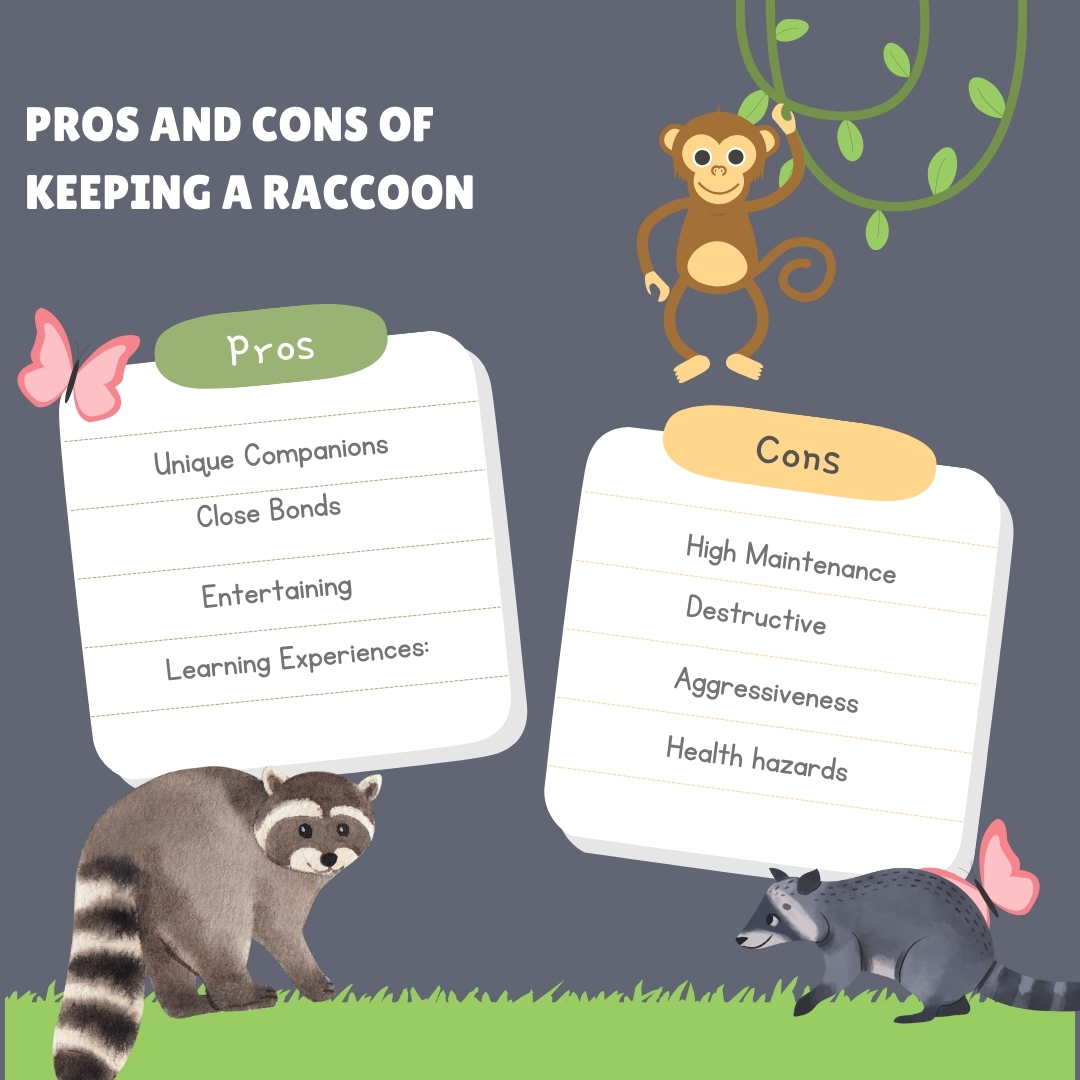
Interesting Facts About Raccoons
- Their paws are sensitive enough to handle things with skill.
- They climb well and are equally good swimmers.
- They remember solutions to tasks for as long as three years.
- They wash food before eating it, but this is a much more common practice in captivity.
- In the case of raccoons, a vast array of vocalizations, such as purring, growling, and chirping, can be assessed.
- Their “mask” markings cut glare and promote night vision.
- They are almost nocturnal, although sometimes diurnal.
- Raccoons have a good sense of smell by which they find their food.
- The hind feet of a raccoon can rotate 180 degrees to provide support to climb down trees headfirst.
- They raid garbage cans and other sources of food in urban areas.
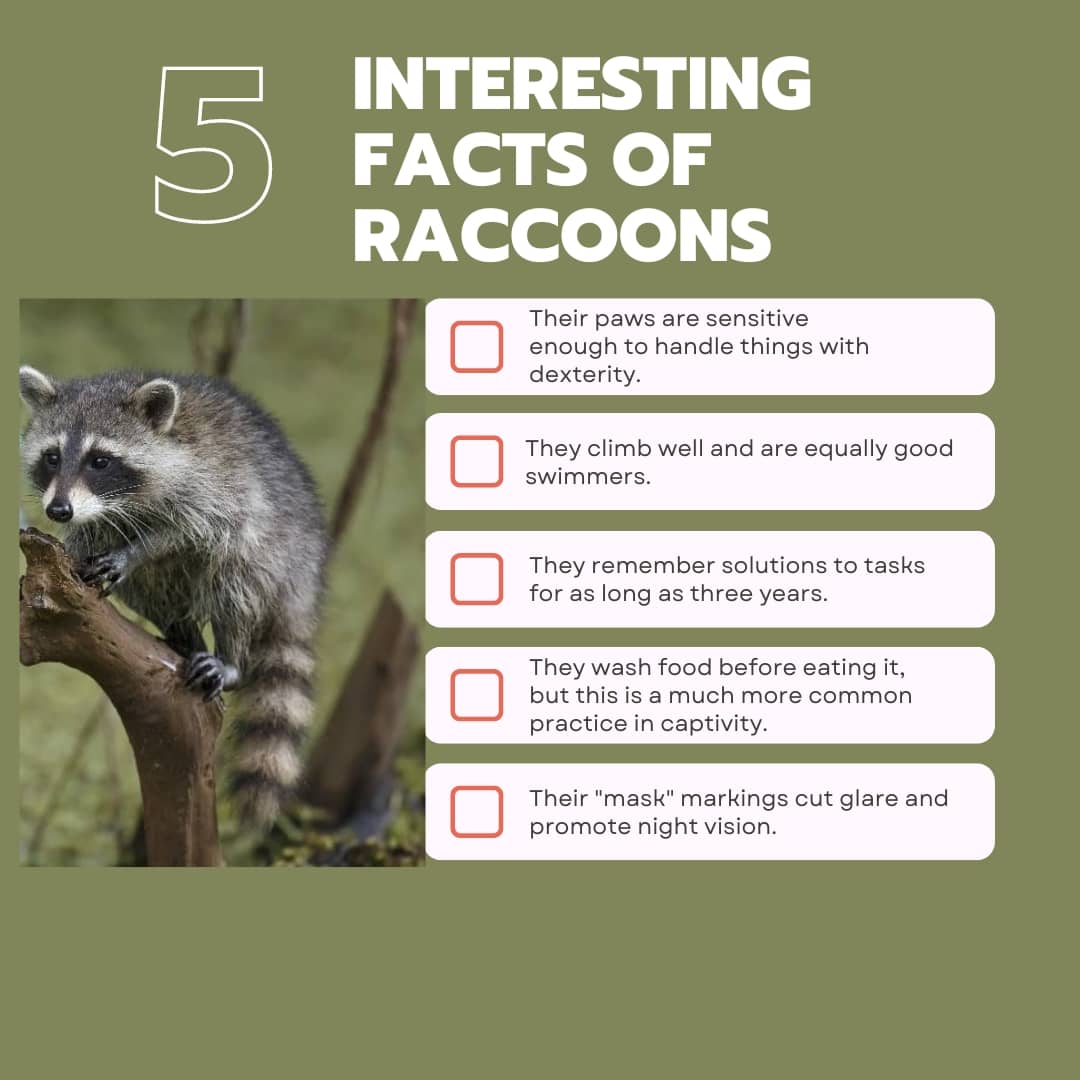
Frequently Asked Questions
Question 1: Are raccoons legal as pets?
Answer: Most countries, states, and territories consider it illegal to have raccoons as pets, so research and find out if it’s legal where you can have a raccoon in your place.
Question 2: Do raccoons need vaccinations?
Answer: Raccoons need vaccinations.As a breeder/keeper of this animal, you are to provide vaccination to the animal against rabies and distemper.
Question 3: How long do pet raccoons live?
Answer: Treated well, raccoons live 10-20 years in captivity.
Question 4: Are Raccoon litter trainable?
Answer: Some raccoons are trainable to use a litter box; however, this differs from one animal to another.
Question 5: Do raccoons get along with other pets?
Answer: They can be compatible if socialized appropriately with other pets; however, the owner must be vigilant to all sorts of situations arising between the two.
Question 6: Are raccoons noisy pets?
Answer: They can be vocal, producing an array of sounds mostly when they are playing or just looking to get attention.
Question 7: Are there diseases that raccoons can give to humans?
Answer: Since raccoons are known to carry diseases like rabies and leptospirosis, it is imperative to keep your home extremely clean and schedule regular veterinary exams.
Question 8: Are raccoons rodents or marsupials?
Answer: Neither of the two groups. Raccoons are classified as members of the Carnivora order, which also includes coatis and kinkajous. They resemble marsupials in appearance, yet the females do not carry their young in a pouch.
Conclusion
Pet raccoons are an exciting, unusual choice for those looking for a very intelligent and different companion animal. On the other hand, owners-to-be must weigh in all the big pros and cons of having one.
A prospective owner should research the local laws on this matter. Health risks are another consideration, for though raccoons are cute, they can transmit diseases to humans. Regular veterinary care and good hygiene practices will help mitigate those risks. Financially, caring for a raccoon can be extremely draining. The costs for housing, food, enrichment, and veterinary care really add up. Moreover, raccoons may live for as long as 20 years in captivity, making this a very serious long-term financial and personal commitment.
While requiring an investment of time, work, and money, a raccoon can be a very rewarding pet. They are very social animals and thus provide companionship and entertainment. Most importantly, raising one can turn out to be quite an educational experience. They are, however, not for everyone. One should consider very practically the needs required for maintaining a raccoon and be able to fulfill those throughout the entire lifetime before having one as a pet. Although raccoons can make great pets, they also come with several challenges and responsibilities. It is a decision that one needs to consider very carefully. Prospective owners should be aware of all the things that they must be capable of providing for their raccoon, together with the fact that it is a long-term commitment.

